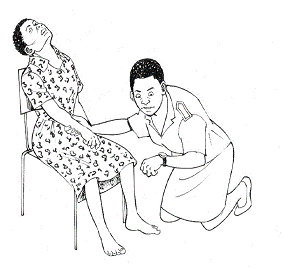Delirium is:
- a sudden onset (hours to days) of confusion
- usually accompanied by drowsiness or agitation
- caused by a general medical or surgical condition (an underlying organic cause)
- usually reversible
- a medical emergency that should not be treated by mental health practitioners alone
There may be a history that hints at the underlying medical/surgical cause e.g. the symptoms may coincide with fever and headache (suggesting an infection) or follow a traffic accident (suggesting trauma).
Some groups are at particular risk of developing delirium:
- People in hospital
- People with chronic conditions such as HIV/AIDS, TB or systemic illness
- Older adults
- Children
- People who misuse alcohol or drugs
- People with unmanaged pain
|
IMPORTANT: Diagnosing delirium and referring appropriately is one of the most important skills you can develop from this quick guide. Failure to recognise and treat delirium can lead to people dying unnecessarily from treatable physical illness. You should always suspect delirium in a patient who presents with sudden onset confusion or drowsiness. Treat it as a medical emergency. |
